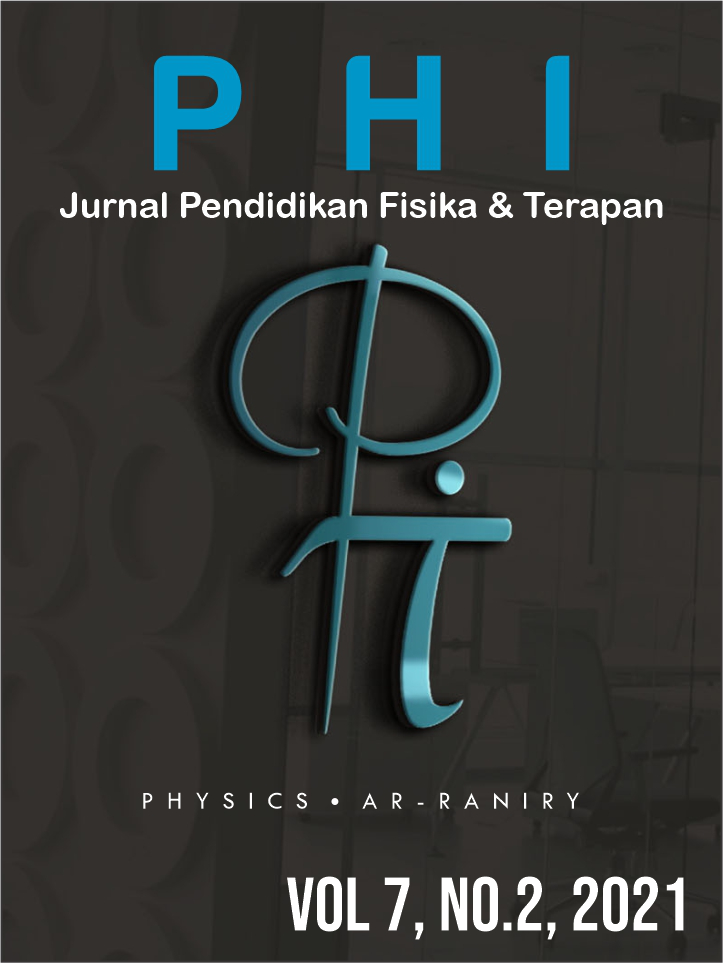Pengaruh Model Pembelajaran Discovery Learning Terhadap Keterampilan Proses Sains Siswa Pada Mata Pelajaran Fisika di SMAN 10 Kota Jambi
DOI:
https://doi.org/10.22373/p-jpft.v7i2.13225Keywords:
model pembelajaran, discovery learning, keterampilan proses sainsAbstract
Model Discovery Learning merupakan model pembelajaran yang dapat menekankan proses pembelajaran yang berpusat pada peserta didik dan pengalaman belajar secara aktif. Tujuan penelitian ini untuk mengetahui apakah terdapat pengaruh model pembelajaran discovery learning terhadap keterampilan proses sains siswa pada mata pelajaran fisika di SMAN 10 Kota Jambi. Metode penelitian ini menggunakan metode kuntittatif dengan jenis kooperatif. Hasil dari penelitian ini yaitu model pembelajaran yang baik dapat meningkatkan keterampilan proses sains siswa dalam pembelajaran terutama pembelajaran fisika. Berdasarkan hasil uji didapatkan bahwa model pembelajaran discovery learning berpengaruh terhadap keterampilan proses sains siswa pada mata pelajaran fisika di SMAN 10 Kota Jambi.
References
Amin , Alfauzan. (2018) Model Pembelajaran Agama Islam Di Sekolah. Yogyakarta: Samudra Biru
Anitah. (2007). Pendekatan Keterampilan Proses Sains. Diunduh di http://www.modelpembelajaran.org.
Budiarti, R. S., Kurniawan, D. A., Septi, S. E., & Perdana, R. (2022). Differences and Relationship Between Attitudes and Self Efficacy of Female and Male Students in Science Subjects in Junior High School. Jurnal Pendidikan Sains Indonesia, 10(1), 73–88. https://doi.org/10.24815/jpsi.v10i1.21979
Dishon, G. (2021). The new natural? Authenticity and the naturalization of educational technologies. Learning, Media and Technology, 46(2), 156–173. https://doi.org/10.1080/17439884.2020.1845727
Fransiska, L., Subagia, I. W., & Sarini, P. (2018). Pengaruh Model Pembelajaran Guided Discovery Terhadap Keterampilan Proses Sains Siswa Smp Negeri 3 Sukasada. Jurnal Pendidikan Dan Pembelajaran Sains Indonesia (JPPSI), 1(2), 68. https://doi.org/10.23887/jppsi.v1i2.17214
Kamid, Rohati, Rahmalisa, Y., Anggo, M., Septi, S. E., Azzahra, M. Z., & Nawahdani, A. M. (2021). Engklek Game ” in mathematics : How difference and relationship student attitude towards science process skills ? Cypriot Journal of Educational Sciences, 16(6), 3109–3123. https://doi.org/https://doi.org/10.18844/cjes.v16i6.6500
Kamid, Sofnidar, Septi, S. E., & Citra, Y. D. (2021). The contribution of the traditional game of congklak to mathematics learning: How is the relationship and influence of interest, cooperative character and student responses. Premiere Educandum: Jurnal Pendidikan Dasar Dan Pembelajaran, 11(2), 280–295.
Kamid, Syaiful, Theis, R., Septi, S. E., & Widodo, R. I. (2021). Traditional “ Congklak ” Games and Cooperative Character in Mathematics Larning. Jurnal Ilmiah Sekolah Dasar, 5(3), 443–451. https://doi.org/http://dx.doi.org/10.23887/jisd.v5i3.37740
Kristin, Firosalia. (2016). Pengaruh Penerapan Model Pembelajaran Discovery Learning Terhadap Hasil Belajar Ips Pada Siswa Kelas 4 Sd. jurnal Scholaria. 6 (1).
Laila Puspita. (2019). Pengembangan modul berbasis keterampilan proses sains sebagai bahan ajar dalam pembelajaran biologi Module development based on science process skills as teaching materials in biological learning. Jurnal Inovasi Pendidikan IPA, 5(1), 79–87.
Manzilati. (2017). Metodologi penelitian kualitative : paradigma , metode dan aplikasi. UB press.
Rifa’i, Ahmad & Catharina Anni. (2011). Psikologi Pendidikan. Semarang: Universitas Negeri Semarang.
Rusmono, & Alghazali, M. I. (2019). Pengaruh Media Cerita Bergambar Dan Literasi Membaca Terhadap Hasil Belajar Siswa Sekolah Dasar. JTP - Jurnal Teknologi Pendidikan, 21(3), 269–282. https://doi.org/10.21009/jtp.v21i3.13386
Sugiyanto, & Wicaksono, A. B. (2017). Penerapan Model Discovery Learning Untuk Meningkatkan Pemahaman Konsep Biologi Siswa Smp. Diklabio: Jurnal Pendidikan Dan Pembelajaran Biologi, 1(1), 82–90. https://doi.org/10.33369/diklabio.1.1.82-90
Van De Heyde, V., & Siebrits, A. (2020). Digital laboratory report writing, assessment and feedback in the 21st century for an extended curriculum programme for physics. Research in Science and Technological Education, 00(00), 1–32. https://doi.org/10.1080/02635143.2020.1775571
Wilson, M. T., Seshadri, S., Streeter, L. V., & Scott, J. B. (2020). Teaching physics concepts without much mathematics: ensuring physics is available to students of all backgrounds. Australasian Journal of Engineering Education, 25(1), 39–54. https://doi.org/10.1080/22054952.2020.1776027
Downloads
Published
Issue
Section
License
Authors who publish with Jurnal Phi agree to the following terms:
- Authors retain copyright and grant the journal right of first publication with the work simultaneously licensed under a Creative Commons Attribution License (CC BY 4.0) that allows others to share the work with an acknowledgment of the work's authorship and initial publication in this journal.
- Authors are able to enter into separate, additional contractual arrangements for the non-exclusive distribution of the journal's published version of the work (e.g., post it to an institutional repository or publish it in a book), with an acknowledgment of its initial publication in this journal.
- Authors are permitted and encouraged to post their work online (e.g., in institutional repositories or on their website) prior to and during the submission process, as it can lead to productive exchanges, as well as earlier and greater citation of published work (See The Effect of Open Access).

















